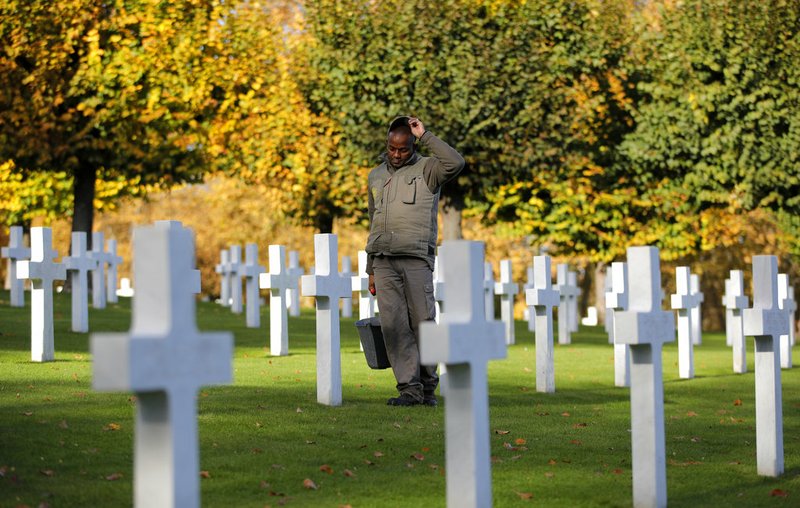PARIS -- Traveling from across the world to battlefields where their soldiers fell 100 years ago, victors and vanquished alike marked those sacrifices ahead of Sunday's Armistice Day and assessed alliances that have been dramatically redrawn since those dark days.
A century ago, the entry of U.S. troops into World War I tipped the momentum toward its allies, including France and Britain. On Saturday, even as he began two days of remembrance of the 1914-18 war, U.S. President Donald Trump said his nation bears far too much of the burden to defend the West.
A flurry of Armistice-related diplomacy once again turned Paris, the jewel that Germany sought to take in 1914 but which the Allies fought to defend, into the center of global attention Saturday, with dozens of world leaders arriving for solemn commemorations planned Sunday.
After an awkward meeting with French President Emmanuel Macron, Trump cancelled a visit to the defining battleground of Belleau Wood because of bad weather. Macron set off to meet with German Chancellor Angela Merkel.
No separate meeting between Trump and Merkel was planned. Instead, Merkel was marking how her nation's bloodstained history with France has become a close alliance that is now the driving force behind the European Union. She and Macron were to visit the site where the armistice was signed in a railway carriage in Compiegne, north of Paris.
In four years of fighting, remembered for brutal trench warfare and the first use of gas, France, the British empire, Russia and the United States had the main armies opposing a German-led coalition that also included the Austro-Hungarian and Ottoman empires.
Almost 10 million soldiers died. France lost 1.4 million and Germany 2 million.
Yet, despite a war that was supposed to end all wars, World War II pitted both sides against each other once again.
Across the line that once marked the Western Front, leaders lauded the courage of soldiers who were killed during the unprecedented slaughter, before converging on Paris for a dinner.
The armistice entered into force on the 11th hour of the 11th day of the 11th month of 1918, and on Sunday 69 world leaders will mark the centennial of the event at the Tomb of the Unknown Soldier, underneath the Arc de Triomphe in central Paris.
At dawn Saturday, Canadian Prime Minister Justin Trudeau went to Vimy Ridge, the battlefield in northern France where Canada found its sense of self when it defeated German opposition against the odds.
Standing amid the white headstones against an ashen sky, Trudeau addressed the fallen, saying what Canada has achieved in the past century has been "a history built on your sacrifice. You stand for the values on which Canada was built."
In southern Belgium's Mons, Canadians were also lauding George Price, the last Commonwealth soldier to die in the war when he was shot by a German sniper two minutes before the armistice took effect.
Trump was looking beyond the tragedy of death and destruction, asking in a tweet: "Is there anything better to celebrate than the end of a war, in particular that one, which was one of the bloodiest and worst of all time?"
After his meeting with Macron, Trump had been scheduled to head to the battlefield of Belleau Wood, 55 miles northeast of the capital, where U.S. troops had their breakthrough battle by stopping a German push for Paris shortly after entering the war in 1917.
The battle of Belleau Wood proved America's mettle to allies and foes alike, and by the time the war ended U.S. forces were at least an equal to any of the other major armies, which were exhausted and depleted.
However, Trump canceled his visit because of bad weather.
For more information on World War I, go to The Associated Press' WWI hub: https://www.apnews.com/WorldWarI
World War I: An AP Centennial Commemorative Edition. Available now exclusively at Amazon: https://amzn.to/2JGrx5U
NW News on 11/11/2018

